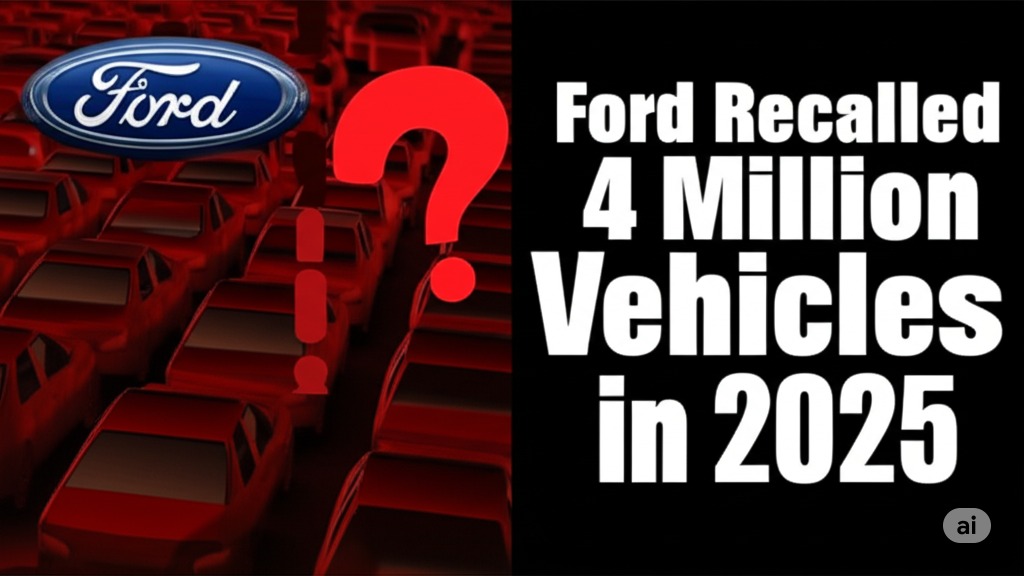🚗 1. Record-Breaking Volume of Recalls
- In first half of 2025, Ford issued 82–94 distinct recalls affecting roughly 4 to 5.6 million Ford and Lincoln vehicles—more than any automaker in history over a full year (Houston Chronicle).
- On average, Ford announced a new recall every 2.1–2.2 days, with each campaign impacting around 50,000+ vehicles (blueovalforums.com).
🔧 2. What’s Being Recalled — Major Issues and Affected Models
Rearview Camera Malfunctions
- Largest recall: over 1.1 million vehicles across 17 Ford and Lincoln models (2021–2024), due to software causing delayed, frozen, or blank rearview camera displays, increasing crash risk (Houston Chronicle).
Fuel Pump Failures
- Around 850,000 Ford and Lincoln vehicles (F‑150, Bronco, Explorer, F‑Series, Mustang, Navigator, Aviator) recalled because a low-pressure fuel pump can fail under hot fuel conditions, causing engine stall risks (CBS News).
Door Latch Software Glitch (Mach‑E)
- Approximately 197,000 Mustang Mach‑E SUVs (models 2021–2025) can trap occupants if electronic door latches fail when battery power drops. Particularly dangerous for children in hot weather (AP News).
Trim and Interior Component Detachments
- 132,914 Lincoln Aviators (2020–2025) recalled over defective adhesive causing C-pillar trim to fall off, posing hazard to other road users or causing crashes (Road & Track).
- Separate recalls exceeded 492,000 Ford Explorer SUVs due to B-pillar door trim detaching, and another affecting front and passenger door trim on earlier Explorers (Reuters).
Other Key Recalls
- Faulty seatbelt anchors in Explorer and Aviator models (2020–2021) affecting ~240,000 vehicles (Houston Chronicle).
- Rear shock absorbers and reservoirs detaching on Bronco/Sport and Maverick vehicles (~150,000 units) (Houston Chronicle).
⚙️ 3. Underlying Causes: Why So Many Failures?
- Aggressive internal audits and proactive recall strategy: Ford launched many recalls—even minor or cosmetic issues—to address defects early and meet regulatory demands (Houston Chronicle).
- Hardware issues dominate: Contrary to modern assumptions, most problems required physical repairs—not just software fixes—since only a handful lacked over-the-air solutions (blueovalforums.com, AutoInsurance.com).
- Complexity of modern vehicles: Increasing sensors, modules, and software systems raise defect risk across trims, cameras, fuel systems, and powertrain components (The Australian).
📅 4. Timeline of Major Recalls
| Date | Issue & Scale | Affected Models |
|---|---|---|
| Early 2025 | Battery failures and rear shock detachment | Bronco Sport, Maverick (2021–2023) |
| Apr 23 | Trim and camera glitches (~160k vehicles) | Six Ford/Lincoln models |
| May 9 | Rearview camera failures (~1.1M vehicles) | 17 models (Bronco, Edge, F‑150, Mach‑E, Transit, more) (Houston Chronicle, https://www.wsaz.com) |
| May 27 | Door & trim detachment (~500k vehicles) | Explorer (2016–17), plus others |
| Mid‑June | Mach‑E door latch glitch (~197k) | Mustang Mach‑E (2021–25) |
| Mid‑June | Aviator trim separation (~132k) | Lincoln Aviator (2020–25) |
| Early July | Fuel pump failures (~850k vehicles) | F‑Series, Bronco, Explorer, Mustang, Aviator, Navigator (CBS News) |
🧭 5. Why Ford’s Recall Surge Matters
Operational Challenges
- Service backlog: Dealers are overwhelmed handling millions of vehicles needing software or hardware fixes.
- Inventory delays: Vehicles must remain off-lot until cleared for sale or repair.
Brand & Financial Effects
- Trust erosion: Consumers may question Ford’s quality—especially critical as Ford pushes EVs and tech-heavy models.
- Cost pressure: Warranty claims and repairs are impacting margins and investor sentiment (blueovalforums.com, The Australian).
Industry Ripple Effects
- Ford’s aggressive recalls reflect broader pressure: regulators tightening oversight and automakers facing more scrutiny on safety and post-sale compliance.
✅ Summary
- Ford has issued more than 80 recalls in just half a year, affecting 4 to 5.6 million vehicles—a record for a single automaker in such a time span (Houston Chronicle, AutoInsurance.com, autoblog.com).
- Key issues include rearview camera errors, fuel pump failure, door latch malfunction, and trim detachments, affecting models across Ford and Lincoln lines.
- Most recalls are the result of proactive safety audits, reflecting FMC’s effort to manage defects early—but they also expose manufacturing and quality-control challenges.
- The surge in recalls strains dealership operations, dents public trust, and raises financial risks—especially critical as Ford transitions into a future of EVs and software-defined vehicles.
